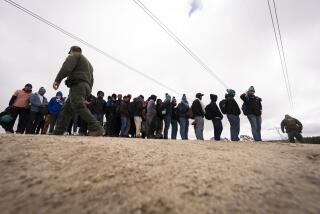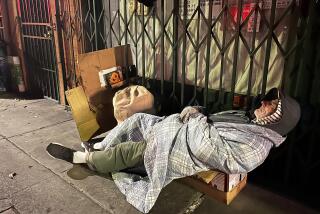Court Won’t Curb Rules for Asylum
In a decision that could affect scores of political asylum cases, the U.S. 9th Circuit Court of Appeals in San Francisco ruled Friday that a South African family could qualify for refugee status because it was persecuted in retaliation for a relative’s abusive and racist treatment of his workers.
Ninth Circuit Judge Kim M. Wardlaw, writing for the majority, said that a family unit can be “a protected social group” under asylum law. The decision means other applicants can apply for asylum if they are oppressed because of their kinships.
In the 7-4 ruling, the majority overruled Justice Department lawyers, who rejected the notion of a family unit as a protected category.
The government’s position represented a radical departure from 20 years of established law and would have created chaos if it had been accepted by the 9th Circuit, which considers many asylum cases, said Harvard University law professor Deborah Anker, who filed a friend-of-the-court brief in the case.
“This decision emphasizes the extraordinarily important role the federal courts play in ensuring that the agencies that administer our asylum laws follow their own precedent, and that we have a rule of law, not of arbitrariness,” said Anker, director of the Immigration and Refugee Clinic run by the law school.
Friday’s ruling came in a case lodged by South Africans Michelle Thomas, her husband, David, and their children Tyneal and Shaldon, who are now living in Ventura County.
The Thomases came to the United States in 1998 “to avoid threats of physical violence and intimidation to which they were subjected because of abuses committed by David’s father, ‘Boss Ronnie,’ who was a foreman at Strongshore Construction in Durban, South Africa,” Wardlaw wrote. “Boss Ronnie was and is a racist who abused his black workers both physically and verbally,” the judge added.
At a 1999 immigration hearing, Michelle Thomas testified that an escalating series of attacks had rendered the family deeply afraid of what would happen if they remained in South Africa. In February 1996, the family dog was poisoned. The next month, their car was vandalized and the tires were slashed. When the Thomases told Boss Ronnie about the incident, he told them they should buy a gun.
In May 1996, human feces was thrown at their residence, according to the decision. Subsequently, feces also was left outside their front and back gates. The Thomases installed higher fencing, put bars on their windows and hired a guard.
Then, in December 1996, “a black man” wearing overalls with a Strongshore logo came to the house, and told Michelle Thomas “he’d come back and cut my throat,” she testified at the immigration hearing.
“At this stage, I was really, really fearing for my life.”
Four months later, according to her testimony, as she stood outside her house with her daughter Tyneal, four black men, including one wearing Strongshore overalls, tried to take the child from her arms. The men ran off after a neighbor, hearing her screams, came out of his house.
In addition, the home of Michelle Thomas’ brother-in-law was broken into, his car was vandalized and his family was threatened.
Michelle Thomas said she believed her family was attacked, because her father-in-law was less vulnerable.
An immigration judge did not question Michelle Thomas’ credibility but rejected the family’s request for political asylum, saying that she had failed to prove her family’s persecution fell under any of the five statutory grounds set out for refugee status: persecution, or a well-founded fear of persecution on account of race, religion, nationality, membership in a particular social group or political opinion.”
The decision was upheld by the Board of Immigration Appeals.
Last year, however, the 9th Circuit overturned the immigration judge’s opinion in a 2-1 decision. Friday’s ruling stemmed from a rehearing by a larger panel of judges that the court granted at the Justice Department’s request.
In the ruling, Wardlaw said, “the harm suffered by the Thomases was not the result of random crime, but was perpetrated on account of the family relationship with Boss Ronnie.”
Wardlaw emphasized that the ruling would bring the 9th Circuit, which had issued conflicting decisions on the subject, in line with Board of Immigration Appeals policy, as well as other circuits that have weighed in on the issue.
Wardlaw rejected the government’s contention that recognizing a family as a particular social group would “confer refugee status on all victims of vendettas or feuds that have swept in the family of the initial target, and all victims of ‘street wars’ between rival criminal families.”
The judge emphasized that an asylum applicant “must still show that the persecution is at the hands of the government or persons or organizations that the government is unable or unwilling to control.”
That issue is not yet resolved for the Thomases. The court sent the case back to the immigration board for a determination on whether the South African government “was unwilling or unable to control the persecution, whether the Thomases have a well-founded fear of future persecution, and the ultimate issue of whether the Thomases are eligible for asylum,” Wardlaw wrote.
In her dissent, Judge Pamela Ann Rymer said the majority went too far in concluding definitively that a family is a particular social group for purposes of refugee status.
Woodland Hills attorney Errol I. Horwitz, who represents the Thomas family, said he was grateful for the ruling.
A Justice Department said “we are reviewing the opinion and considering our options,” including an appeal to the Supreme Court.
More to Read
Sign up for Essential California
The most important California stories and recommendations in your inbox every morning.
You may occasionally receive promotional content from the Los Angeles Times.










